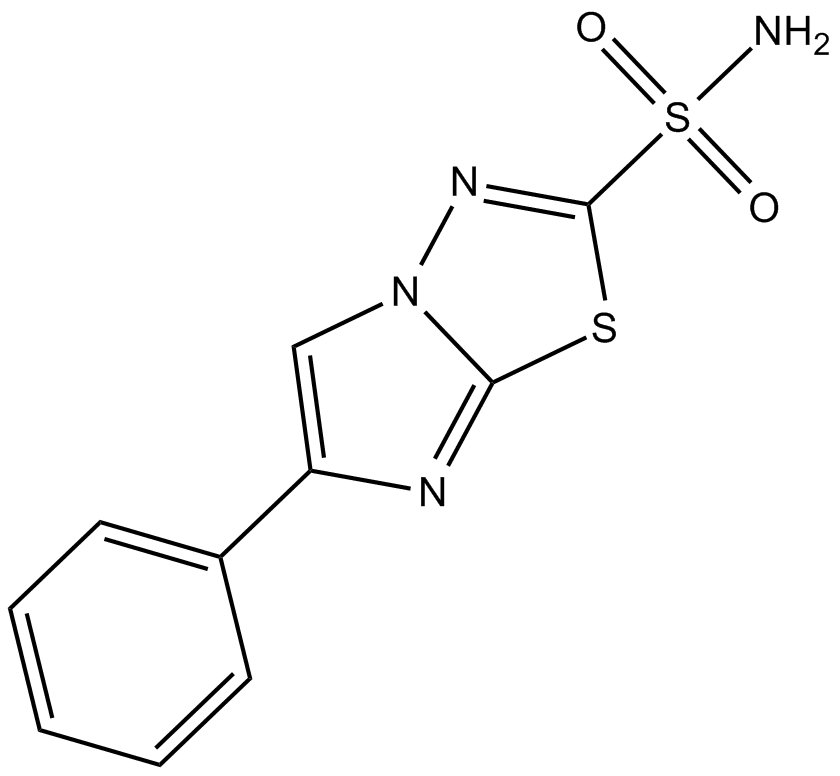AEG 3482 |
| Catalog No.GC10204 |
AEG 3482는 HSP70(heat shock protein 70)의 유도된 발현을 통해 Jun kinase(JNK) 활성을 억제하는 강력한 항세포사멸 화합물입니다.
Products are for research use only. Not for human use. We do not sell to patients.

Cas No.: 63735-71-7
Sample solution is provided at 25 µL, 10mM.
AEG3482 is a small-molecule inhibitor of Jun kinase (JNK)-dependent apoptosis. [1,2]
Jun kinases, also called Jun N-terminal kinase stress-activated protein kinases. Activation of the JNK signaling pathway is a major event in neuronal apoptosis. This is proved by pathological specimens from Alzheimer’s disease, as well as samples from mouse models of Alzheimer’s and Huntington’s disease, reveal activated JNK. [2]
AEG3482 blocks apoptosis induced by the p75 neurotrophin receptor (p75NTR) or NRAGE, which is p75NTR’s cytosolic interactor,. AEG3482 inhibits proapoptotic JNK activity. AEG3482 induces production of heat shock protein 70 (HSP70) which is an endogenous inhibitor of JNK. HSP70 accumulation is required for the AEG3482-induced JNK blockade. [1]
As described, activation of C-jun N-terminal kinase (JNK) signaling is associated with neuronal cell death. AEG3482 interacts with heat shock protein 90 leading to inhibition of JNK and blockade of neuronal apoptosis. So AEG3482 can serve as useful tools for basic research, and it may have therapeutic potential for the treatment of acute and chronic neurological disorders. In the neuropathologicalstate, the chaperone-mediated stress response may be primed for response to Hsp90 inhibitors; and AEG3482, may be selective neuroprotective agents.[1,2]
References:
[1]Salehi AH, Morris SJ, Ho WC, etal. , AEG3482 is an antiapoptotic compound that inhibits Jun kinase activity and cell death through induced expression of heat shock protein 70. Chem Biol. 2006 Feb;13(2):213-23.
[2] Gallo KA. Targeting HSP90 to halt neurodegeneration. Chem Biol. 2006 Feb;13(2):115-6.
| Cell experiment [1]: | |
|
Cell lines |
PC12 neuronal cells |
|
Preparation method |
The solubility of this compound in DMSO is > 14 mg/mL. General tips for obtaining a higher concentration: Please warm the tube at 37 ℃ for 10 minutes and/or shake it in the ultrasonic bath for a while. Stock solution can be stored below -20℃ for several months. |
|
Reacting condition |
10, 20 and 40 µM, 18 h |
|
Applications |
AEG 3482 is a potent antiapoptotic compound. In PC12 neuronal cells AEG 3482 inhibited proapoptotic JNK activity and blocked p75NTR- and NRAGE-induced apoptosis. AEG 3482 inhibited the JNK pathway through increasing HSP70 expression. |
|
References: [1]. Salehi A H, Morris S J, Ho W C, et al. AEG3482 is an antiapoptotic compound that inhibits Jun kinase activity and cell death through induced expression of heat shock protein 70[J]. Chemistry & biology, 2006, 13(2): 213-223. | |
| Cas No. | 63735-71-7 | SDF | |
| Chemical Name | 6-phenylimidazo[2,1-b][1,3,4]thiadiazole-2-sulfonamide | ||
| Canonical SMILES | NS(C1=NN(C(S1)=N2)C=C2C3=CC=CC=C3)(=O)=O | ||
| Formula | C10H8N4O2S2 | M.Wt | 280.33 |
| Solubility | ≥ 14mg/mL in DMSO | Storage | Store at RT |
| General tips | Please select the appropriate solvent to prepare the stock solution according to the
solubility of the product in different solvents; once the solution is prepared, please store it in
separate packages to avoid product failure caused by repeated freezing and thawing.Storage method
and period of the stock solution: When stored at -80°C, please use it within 6 months; when stored
at -20°C, please use it within 1 month. To increase solubility, heat the tube to 37°C and then oscillate in an ultrasonic bath for some time. |
||
| Shipping Condition | Evaluation sample solution: shipped with blue ice. All other sizes available: with RT, or with Blue Ice upon request. | ||
| Prepare stock solution | |||

|
1 mg | 5 mg | 10 mg |
| 1 mM | 3.5672 mL | 17.8361 mL | 35.6722 mL |
| 5 mM | 0.7134 mL | 3.5672 mL | 7.1344 mL |
| 10 mM | 0.3567 mL | 1.7836 mL | 3.5672 mL |
Step 1: Enter information below (Recommended: An additional animal making an allowance for loss during the experiment)
 g
g
 μL
μL

Step 2: Enter the in vivo formulation (This is only the calculator, not formulation. Please contact us first if there is no in vivo formulation at the solubility Section.)
Calculation results:
Working concentration: mg/ml;
Method for preparing DMSO master liquid: mg drug pre-dissolved in μL DMSO ( Master liquid concentration mg/mL, Please contact us first if the concentration exceeds the DMSO solubility of the batch of drug. )
Method for preparing in vivo formulation: Take μL DMSO master liquid, next addμL PEG300, mix and clarify, next addμL Tween 80, mix and clarify, next add μL ddH2O, mix and clarify.
Method for preparing in vivo formulation: Take μL DMSO master liquid, next add μL Corn oil, mix and clarify.
Note: 1. Please make sure the liquid is clear before adding the next solvent.
2. Be sure to add the solvent(s) in order. You must ensure that the solution obtained, in the previous addition, is a clear solution before proceeding to add the next solvent. Physical methods such as vortex, ultrasound or hot water bath can be used to aid dissolving.
3. All of the above co-solvents are available for purchase on the GlpBio website.
Quality Control & SDS
- View current batch:
- Purity: >99.00%
- COA (Certificate Of Analysis)
- SDS (Safety Data Sheet)
- Datasheet
Average Rating: 5 (Based on Reviews and 38 reference(s) in Google Scholar.)
GLPBIO products are for RESEARCH USE ONLY. Please make sure your review or question is research based.
Required fields are marked with *



















